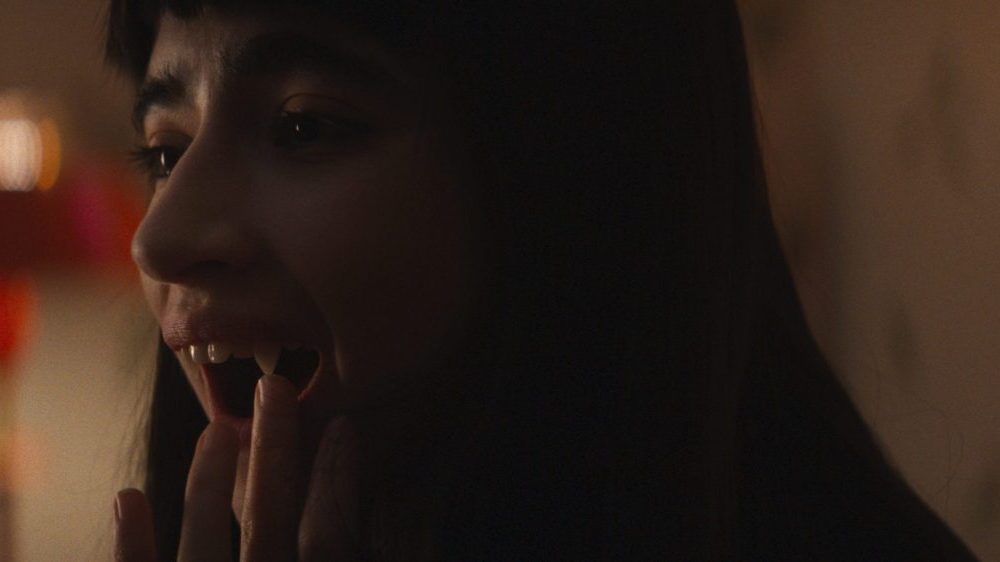
The unkillable vampire legend gets one of its frequent cinematic resurrections (this Venice Film Festival alone boasted three more: “El Conde” in competition, “En Attendant la Nuit” in Horizons and “The Vourdalak” in Critics’ Week) with Québécois director Ariane Louis-Seize’s sweetly gothy Venice Days winner, a film wittily — if too comprehensively — described by its title: “Humanist Vampire Seeking Consenting Suicidal Person.” The idea of a vampire who doesn’t want to kill is hardly without precedent. But Louis-Seize’s eager debut, intentionally or otherwise, plays to a relatively vamp-starved demographic, providing continuity to kids who have long outgrown the “Sesame Street” version, but are still a bit young for the emo lustiness of the “Twilight” franchise. It’s more fairy tale than scary tale.
It is, however, a fine showcase for the witchy charisma of star Sara Montpetit who, after playing the doom-fixated object of a first crush in Charlotte Le Bon’s terrific “Falcon Lake,” seems hellbent on cornering the market in gloomy Francophone teenagers navigating an entree into adulthood in which sex and death are intertwined. Only here as Sasha, the 62-year-old vampire who presents as a teenage girl, she is not only death-obsessed but actually undead, and has been, it is implied, since birth.
Sasha has always been different from her blithely bloodsucking kinfolk. On her birthday, little Sasha (Lilas-Rose Cantin) is being entertained by a party clown, only to quail when it becomes clear that the man in the wig and the red nose is there to be both dinner and a show. Some years later, Sasha (Montpetit) has never developed fangs and survives on the largesse of her doting father (Steve LaPlante) and less indulgent mother (Sophie Cadieux). They stock the fridge with baggies of blood drained from their kills, which Sara sucks down like Capri-Sun.
At night she mopes around Montreal, which is here a kind of Buffyverse where ordinary people are ostensibly unaware of the undead menace, but don’t seem terribly surprised when they encounter it. On one of these nocturnal recces, she sees Paul (Félix-Antoine Bénard) perched on the roof of the bowling alley where he works, contemplating jumping. Paul is a troubled, sensitive high-schooler whose loving but distracted mother is unaware that he is the target of daily bullying. And though, this night, he decides to come down off the roof the long way, he has the look of someone postponing rather than cancelling. Sasha is intrigued. The next time she sees him, he sees her too, and is startled enough to run into a wall, drawing blood. Sasha feels her fangs break through her gums and flees.
Discovering that she’s now equipped to do her own murdering, her parents cut off her blood supply, sending Sasha to live with her cousin Denise (Noémie O’Farrell) a snarling redhead with as few qualms about killing as Sasha has kills. But the connection that Sasha and Paul have formed suggests a different, more mutually desirable way out — if only feelings don’t get in the way. When Sasha offers willing victim Paul a reprieve of one last night, to spend together avenging all the wrongs against him, it’s clear she’s looking for a way to postpone the deed. Because she like, like likes him.
Louis-Seize’s eye for style and Shawn Pavlin’s darkly fragrant cinematography lend a graphic-novel coolness to “Humanist Vampire,” especially in the tightly framed two-shots or the heroizing stances that Sasha is caught in, standing atop shipping containers with her bolt of silken hair twitching up at the tips like irritated-cat tails. But it is also slightly wasteful how Louis-Seize and co-writer Christine Doyon’s schematic screenplay takes a myth as rooted in kink as the vampire legend and scrupulously, chastely unkinks it, delivering little gore and a romance mostly confined to burning glances and hesitant hand-holding.
That’s not to suggest there is no moral iffiness here. There’s the oddly absolutist idea that because the first guy Sasha actually kills is a nasty fellow, the moral injunction against murdering him is lifted. And the notion of consent in the suicidal isn’t closely investigated either: there’s no discussion of whether a depressive mental state might render such “consent” dubious, not to mention all those potential suicides who should be helped in off the ledge, rather than shown a more convenient way to jump.
But “Humanist Vampire” doesn’t want us to think too deeply, and aims mostly to charm. Largely it succeeds, which is its own kind of critique in this post-“Titane” and “A Girl Walks Home Alone At Night” era, when some viewers might expect provocation or transgression from their horror archetypes. “Humanist Vampire” is bad news for them, but as a good-natured, dark-tinged, teen-rom-com dressed up in a stylish Halloween costume, it’s good news for “Wednesday” fans, and any others who want Nosferatu to be more awww than aaaargh.













